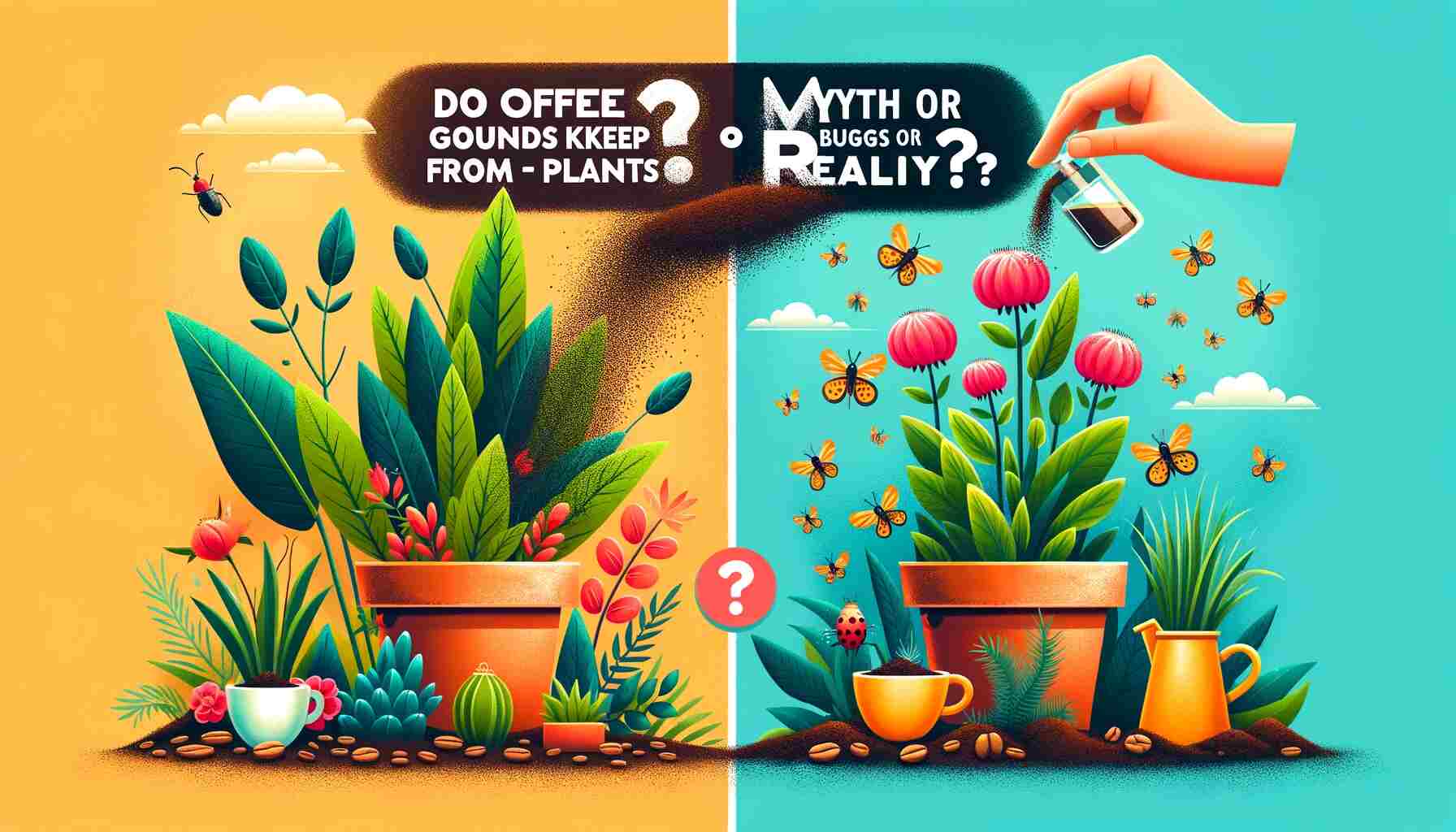If you’re an avid gardener like me, you might have heard about the potential benefits of using coffee grounds to keep bugs away from your plants. But is this practice based on fact or just another gardening myth?
Coffee grounds can potentially deter certain pests from plants due to their nitrogen content, which may disrupt insect exoskeletons. However, the effectiveness can vary, and it’s not a guaranteed solution.
In this comprehensive article, I will dive deep into the topic to uncover the truth behind using coffee grounds as a natural pest repellent for your garden. I’ll also explore the science behind it, its practical application, and potential pros and cons.
The Science Behind Coffee Grounds
Before delving into the practical aspects, it’s essential to understand the science behind using coffee grounds as a pest deterrent. Coffee grounds are rich in nitrogen, which is an essential nutrient for plant growth. Nitrogen also happens to be a key element in various chemical compounds that make up insect exoskeletons. The theory is that when insects come into contact with coffee grounds, the nitrogen may disrupt their protective exoskeleton, potentially deterring them from your plants.
Practical Application
Now that you have a basic understanding of the science, let’s explore how you can use coffee grounds effectively to keep bugs away from your plants:
1. Pest Barrier
Coffee grounds can be spread around the base of your plants to create a barrier. This can physically deter crawling insects like ants and slugs, preventing them from reaching your plants. Be sure to replenish the grounds regularly, as they decompose over time.
2. Mulch
Using coffee grounds as mulch not only deters pests but also offers other benefits. They help retain moisture, regulate soil temperature, and add nutrients to the soil as they break down. This method is particularly useful for acid-loving plants like azaleas and blueberries.
3. Companion Planting
Consider planting coffee alongside other plants in your garden. Some gardeners believe that the aroma of coffee can confuse and deter pests. However, the scientific evidence supporting this claim is limited.
Pros of Using Coffee Grounds
While the effectiveness of coffee grounds in pest control varies, there are several advantages to using them in your garden:
1. Sustainability
Using coffee grounds is an eco-friendly practice that repurposes waste. It reduces the amount of organic material going to landfills and promotes sustainable gardening.
2. Nutrient Boost
Coffee grounds are a good source of nitrogen, potassium, and other essential minerals. When they break down, they enrich the soil, benefiting your plants.
3. Cost-Efficiency
Coffee grounds are readily available and often free from your local coffee shops. This makes them an economical choice for pest control.
Cons of Using Coffee Grounds
While coffee grounds can be beneficial, there are also some potential drawbacks to consider:
1. Inconsistent Results
The effectiveness of coffee grounds in pest control can vary from plant to plant and from one garden to another. Some pests may be deterred, while others may not be affected at all.
2. Acidic pH
Coffee grounds are acidic, which can be detrimental to plants that prefer alkaline soil. Be cautious when using them around plants with specific pH requirements.
3. Mold Growth
Coffee grounds can create a favorable environment for mold growth, especially if they remain moist. Mold can harm your plants and negate the benefits of using coffee grounds.
Scientific Studies and Expert Opinions
To get a better understanding of the effectiveness of coffee grounds in pest control, let’s turn to scientific studies and expert opinions:
1. Research Findings
- A study published in the “Journal of Environmental Science and Health” suggested that caffeine, a compound found in coffee, can have pesticidal properties. However, the study focused on caffeine isolated from coffee, not coffee grounds themselves.
- Another study from the University of Hawai’i at Manoa found that coffee grounds can suppress certain weed species. While this doesn’t directly address pest control, it does highlight coffee grounds’ impact on plant growth.
2. Expert Opinions
- Master gardeners and horticulturists often have mixed opinions about using coffee grounds for pest control. Some report success, while others find it ineffective or even problematic due to the acidity.
- The consensus among experts is that coffee grounds should be used cautiously, with attention to the specific needs of your plants and the types of pests you’re dealing with.
Alternative Pest Control Methods
While coffee grounds may have their merits, it’s important to explore alternative pest control methods as well. Here are a few to consider:
1. Neem Oil
Neem oil is a natural pesticide derived from the neem tree. It’s effective against a wide range of pests and is safe for most plants.
2. Companion Planting
Certain plants can be strategically planted alongside your crops to repel pests. For example, marigolds can deter aphids and nematodes, while basil can keep flies and mosquitoes at bay.
3. Beneficial Insects
Encourage the presence of beneficial insects like ladybugs and parasitic wasps in your garden. They can help control pest populations naturally.
Conclusion
Using coffee grounds as a natural pest repellent for your plants is an intriguing idea with both potential benefits and drawbacks. While the science behind it suggests some validity, the practical results can vary. It’s essential to approach this method with caution, considering the specific needs of your plants and the types of pests you’re dealing with.
Incorporating coffee grounds into your gardening routine can be an eco-friendly and cost-effective practice that enriches your soil and potentially deters some pests. However, it should not be relied upon as the sole solution for pest control. Experiment with different methods, including alternative pest control measures, to find the best approach for your garden.
Remember that successful gardening often involves a combination of strategies, and staying informed about the latest research and expert opinions is key to maintaining a healthy and pest-free garden.
Related Article:
Can Coffee Grounds Keep Mosquitoes Away: Unraveling the Myth & Science
Can Coffee Grounds Keep Mice Away: Debunking the Myth
Do Coffee Grounds Keep Squirrels Away: Debunking the Myth with Science
Do Coffee Grounds Repel Slugs and Snails: Solved!










